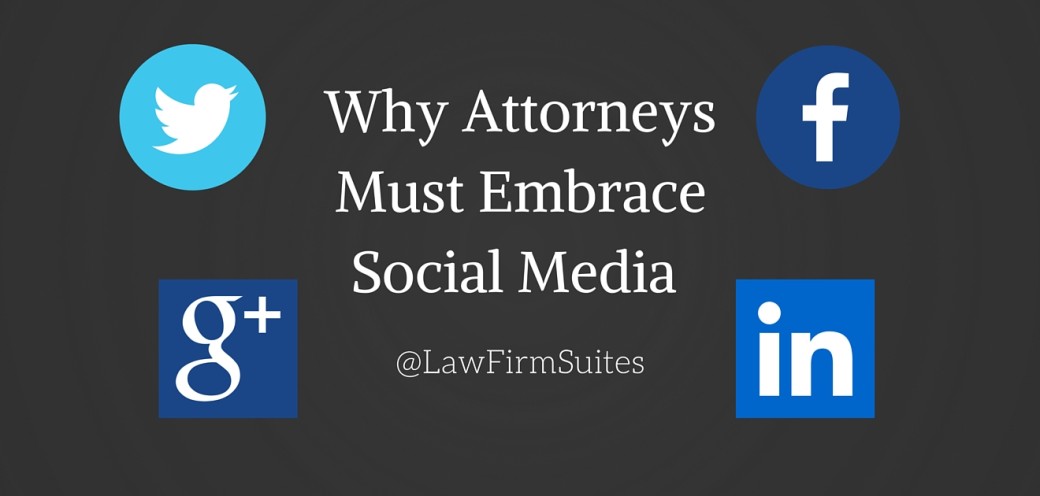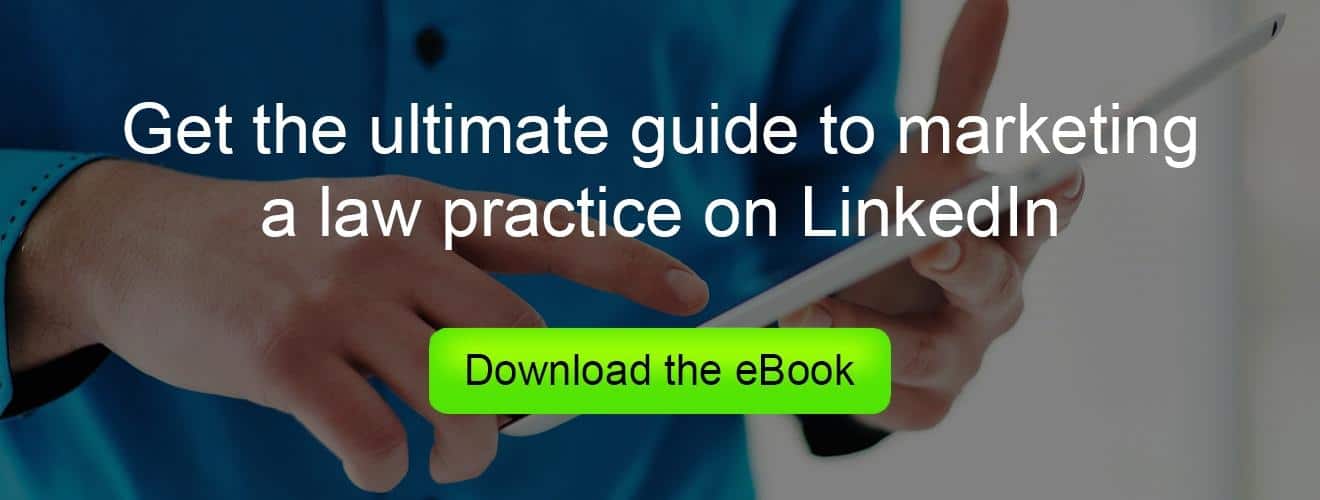A reluctance to fully embrace using social media could mean you’re missing out on new business.
As a group, attorneys tend to be late adopters of new technology. This is particularly true of their use of social media for business development. Reluctance to get onboard the social train means many attorneys are missing out on an opportunity to grow their practice.
According to a report from Pew Research Center, nearly two thirds of American adults are using social networking sites.
Having no social media presence will instantly make you seem out of touch to clients and it shows that you aren’t keeping pace with what the rest of society is doing.
Here are four reasons why it is critical for attorneys to embrace social media:
It is a part of the client’s research process.
It is common knowledge that most people ask someone they know for a referral when they need a lawyer. But what if they need a lawyer with a highly specialized practice?
A survey conducted by Mike Blumenthal found that 21.9 percent of participants would begin their search for a lawyer on a search engine.
Increased online exposure, including on social platforms, often leads to increased potential to expand your client base. It is critical that you optimize your social media accounts and publish broadly across many platforms so you are easier to find.
There is some evidence, at least on certain search platforms, that your influence on social media will help your website be found through organic search. According to the 2015 SearchMetrics ranking signals correlation study, social engagement such as Facebook likes, Twitter tweets, and Google Plus +1s correlate closely with higher organic search rankings, and social media’s influence on search is expected to increase in the future.
Even if a potential client gets a referral from a friend, you should expect that they will still look you up online. Do you know what they will find? Have you made sure the information available to them adds to your credibility?
Clients will look at your website, but that isn’t enough. You need to make sure your social media presence is representative of your abilities.
You need to take the time to iron out your social media presence. Click To TweetFor example, you can use Twitter to consistently share industry news in order to demonstrate your awareness of what is happening in your practice area. Taking advantage of LinkedIn’s publishing platform will help you establish yourself as a thought leader.
Nowadays, people want to know more because they have access to more. An active social media presence allows potential clients to easily research you and your firm.
A lack of information leaves opportunity for competing attorneys who do have a quality online presence to be contacted by a potential client.
You need to maintain your image.
According to the ABA’s 2014 Legal Technology Survey Report, solos and small firms are leading the way in engaging on social media networks, blogging and website development.
As a solo attorney, you are your brand. Clients support brands because they share their values and feel a connection to them.
When it comes to getting retained by clients, your experience no longer speaks for itself. We all know that people do business with people they like, but increasingly, clients will have already formed an opinion about you before they even pick up the phone, and they are doing this by checking you out on social platforms.
So maybe you’ve created a Twitter account or you have a LinkedIn profile. You’ve embraced social media, right? Wrong.
Simply being on social media does not necessarily mean you’ve fully embraced it or what it can do for your practice. You need to make sure you’re maintaining your image properly.
Social media is a useful tool for amplifying your professional image by offering you a platform to share industry knowledge and cultivate an online voice that demonstrates your expertise. But it also gives you a chance to communicate the real you.
Like it or not, your clients are using your social media accounts to not only determine your legal skills, but also whether they think they will like working with you. It is up to you to take control of what your clients are learning about you.
Remember that social media is an active tactic for business development. Creating a social media profile and leaving it incomplete or updating it infrequently can severely damage your brand image.
Think of your social media presence as the suit you wear to client meetings. You are presenting an image that communicates your credibility and personal brand.
Like a wrinkled shirt, being lackluster about your social media presence can often be viewed by clients as sloppy and unprofessional. You need to take the time to iron out your social media presence.
You can use it to connect with clients.
Many lawyers expect their social media presence to magically drive client development; but it doesn’t typically work that way. Like most marketing techniques, success comes with consistency. Luckily, a small amount of participation on social media can often yield amazing (and sometimes unexpected) results.
For example, a partner at a Milwaukee firm, Davis & Kuelthau s.c., joined LinkedIn and emailed his clients to connect.
As a result, not only did they accept his invitation, but also they contacted him, saying, “I’ve been meaning to get in touch with you about…” With very little effort, he was able to reconnect with current clients and find two cases to work on.
Solos and small firms are leading the way in engaging on social media networks. Click To TweetLinkedIn is fast becoming an asset to any lawyer who wants to easily build a professional online presence and connect with clients.
LinkedIn groups are especially helpful to lawyers who want to build relationships with potential clients. You can do this by joining the groups your prospects are going to for information and engaging in conversations. It will give you an opportunity to show off your expertise in front of prospects, which is often the best way to attract new clients.
Some lawyers might be concerned about the ethical guidelines of using social media. However, as millennials continue to change the legal profession and insist on communicating via social media, it will become important for every attorney to start developing his or her own best practices.
It can result in referral relationships.
Platforms such as LinkedIn or Twitter can help you find a community of like-minded professionals in your industry.
Being actively involved in the online community results in meaningful professional relationships with the potential for referrals. For example, a real estate agent on LinkedIn who frequently engages in industry-related conversation with a real estate lawyer might refer a client to that lawyer.
Social media helps attorneys find new business, create name recognition and develop credibility. Your goal should be to create a social media presence that is easily accessible to clients, establishes trust in your legal abilities and put forward the best you.
If done correctly, a strong social media presence will help propel your firm into a successful future.



on said:
Great article and I wholeheartedly agree, people want to know who they are working with, people need to know that you are a regular person just like them so if a problem arises, it will be communicated and worked-out. Any attorney that I retain, I research online and try to look at who he/she is as a person so it will be easy to communicate during our transaction.
on said:
Thanks for reading, Deborah! I couldn’t agree with you more. Effective communication between attorneys and their clients is critical; however, as you said, a client has to feel as though their attorney is a regular person just like them. Social media is a powerful tool for improving communication and enhancing client-attorney relationships.